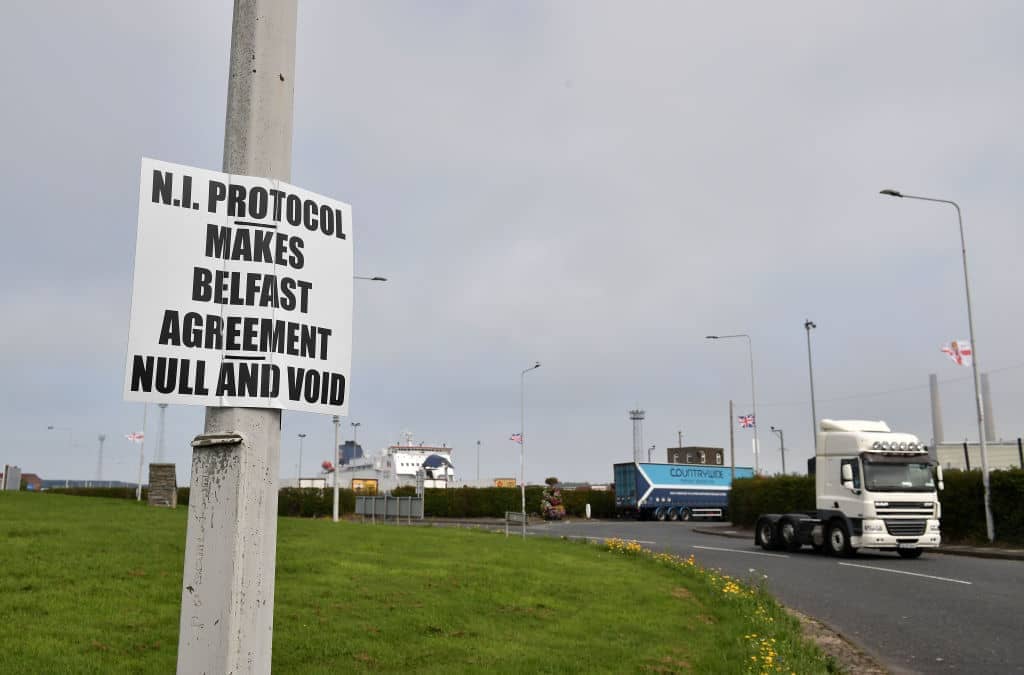Sir Jeffrey Donaldson’s leadership of the DUP has been characterised as something of a phoney war against the Northern Ireland Protocol (NIP) – until now.
After months of threatening to pull down the Northern Ireland executive should he and his party not be satisfied with progress on removing the protocol (which creates checks on goods between Britain and Northern Ireland) Donaldson has made his move. Paul Givan, something of a lame duck in his role as First Minister, has resigned and left his post at midnight. Because of the intricacies of Stormont, the deputy First Minister Michelle O’Neill of Sinn Fein will also depart but junior ministers will remain in post until an election.
Speaking afterwards, Donaldson said that he and his party would ‘not give our consent to consigning Northern Ireland to second best.’ The speech featured all of his greatest hits, taking aim at the UK government, the EU, Dublin and their Stormont allies for their intransigence over the protocol.
A change of the guard in Downing Street may be Donaldson’s only saving grace
The DUP and its outriders have rationalised today’s developments in the following terms: in the perceived absence of progress on removing the protocol, they have been left with little option but to exercise what levers are left to them. This includes yesterday’s decision by the Agriculture Minister Edwin Poots to suspend protocol related checks on goods entering Northern Ireland from Great Britain, though civil service compliance with this instruction has not been forthcoming.
It was notable, however, that in his speech Donaldson aired long-term unionist grievances around ‘parity of esteem’ in Northern Ireland, citing recent examples such as Sinn Fein ministers refusing to release funds to mark the province’s centenary and the Queen’s jubilee.
That his address touched on unionist alienation more broadly beyond the protocol was significant, alongside the line that ‘it is time for the people across Northern Ireland to have their say’. The next Stormont election is scheduled for May, though in light of today’s developments Sinn Fein have called for it to be brought forward.
The DUP’s tactics are clear; they hope that an election conducted on a rally round the flag basis will allow them to galvanise unionists and so demonstrate via the ballot box to London, Dublin and Brussels that the protocol does not have cross-community support.
Donaldson will be hoping that the immediate focus of an election campaign – framed in such existential terms – will win back support lost to the Traditional Unionist Voice and the Ulster Unionists and inject some discipline into his fractious party.
But questions remain about the strategic benefits of such a move. The DUP are far behind Sinn Fein in the polls; what happens if an election delivers a republican first minister, a pro-protocol majority in Stormont and a further diminished unionist cohort in the assembly?
It would hand the initiative to those who believe in the protocol, but simultaneously leave any form of viable power-sharing dead in the water as the DUP would be unlikely to participate. And a monumental unionist setback would do nothing but fuel the background noise around Irish unity – though it is worth being reminded that the union still polls favourably in Northern Ireland even though its parties may not.
Direct rule from Westminster, which has no desire for the day-to-day administration of Northern Ireland to be added to its ledger, would surely follow. Donaldson made his irritation with London’s blasé attitude to the protocol clear in his speech. The course of action he has set out now is a high stakes way of getting their attention. But given Conservative indifference to the DUP, it will be unlikely to shift the dial. A change of the guard in Downing Street and a new regime with a more constructive approach to dealings with the EU may be his only saving grace.
Many in Northern Ireland will not mourn the shuttering of Stormont – plenty regard it and the people within it as an incompetent indulgence. However, today’s move means certain issues – such as a formal apology for historical incidents of institutional child abuse – will fall by the wayside. An early election will also mean domestic violence legislation cannot proceed. For that wedge of the population not concerned by flags, anthems and border checks, that will resonate more.
The developments this week are reflective of a leader and a party which believes it has nowhere else to go, bounced into this position by a fatal mix of its own decision making, atrophying support and indifference from London. Donaldson has decreed that ‘enough is enough’ – however, the Northern Irish electorate may throw those words back at him in the weeks ahead.






Comments